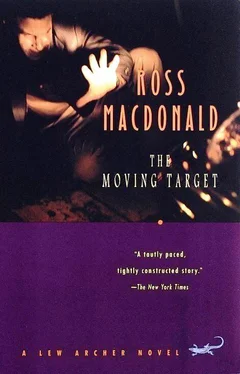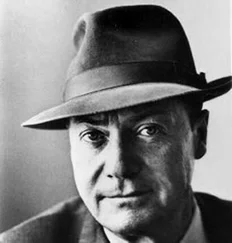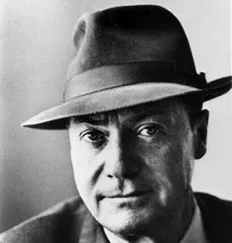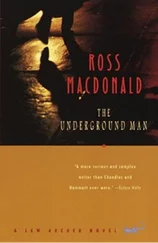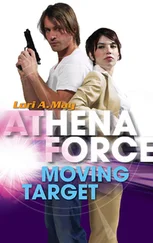Leaving my lights out, I drove across the highway and along its shoulder to the side road. Before I reached it I heard three sounds, remote and muffled by the fog. The banshee wail of brakes, the sound of a shot, the ascending roar of a motor picking up speed.
The trough of the side road was filled with diffused white light. I stopped my car a few feet short of the intersection. Another car came out of the side road and turned left in front of me toward Los Angeles. It was a long-nosed convertible painted light cream. I couldn’t see the driver through the blurred side window, but I thought I saw a dark mass of woman’s hair. I wasn’t in position to give chase, and I couldn’t have anyway.
I switched on my fog lamps and turned up the road. A few hundred yards from the highway a car was standing with two of its wheels in the ditch. I parked behind it and got out with the gun in my hand. It was a black limousine, a pre-war Lincoln custom job. The engine was idling and the lights were on. The license number was 62 S 895. I opened the front door with my left hand, my gun cocked in my right.
A little man leaned toward me, peering into the fog with intent dead eyes. I caught him before he fell out. I’d been feeling death in my bones for twenty-four hours.
He was still wearing his leather cap sharply tilted on the left side of his head. There was a round hole in the cap above his left ear. The left side of his face was peppered with black powder burns. His head had been knocked askew by the force of the bullet, and rolled on his shoulder when I pushed him upright. His black-nailed hands slipped off the steering wheel and dangled at his sides.
Holding him up in the seat with one hand, I went through his pockets with the other. The side pockets of his leather windbreaker contained a windproof lighter smelling of gasoline, a cheap wooden case half full of cigarettes rolled in brown wheat-straw paper, and a four-inch spring-knife. There was a worn sharkskin wallet in the hip pocket of his levis, containing eighteen or twenty dollars in small bills and a California driver’s license recently issued to one Lawrence Becker. The address on the license was a cheap Los Angeles hotel teetering on the edge of Skid Row. It wouldn’t be his address, and Lawrence Becker wouldn’t be his name.
The left side pocket of the levis held a dirty comb in a leatherette case. The other pocket held a heavy bunch of car keys on a chain – keys for every make of car from Chevrolet to Cadillac – and a half-used book of matches labeled: “Souvenir of The Corner, Cocktails and Steaks, Highway 101 South of Buenavista.” He had nothing on under his wind-breaker but a T-shirt.
There were a few short marijuana butts in the dashboard ash tray, but the rest of the car was as clean as a whistle. Not even a registration card in the glove compartment, nor a hundred thousand dollars in moderate-sized bills.
I put the things back in his pockets and propped him up in the seat, slamming the door to hold him. I looked back once before I got into my car. The lights of the Lincoln were still burning, the idling motor still sending out a steady trickle of vapor from the exhaust. The dead man hunched at the wheel looked ready to start on a long, fast trip to another part of the country.
Graves’s Studebaker was parked by the pumps at the filling station. Graves and Taggert were standing beside it and came running when I drove up. Their faces were pale and slick with excitement.
“It was a black limousine,” Graves said. “We drove away slow and saw him stop at the corner. I couldn’t see his face, but he was wearing a cap and a leather windbreaker.”
“He still is.”
“Did you see him pass you?” Taggert’s voice was so tense he whispered.
“He turned off before he got to me. He’s sitting in his car on the next side road with a bullet in his head.”
“Good Christ!” Graves cried. “You didn’t shoot him, Lew?”
“Somebody else did. A cream convertible came out of the side road a minute after the shot. I think a woman was driving. She headed for L. A. Now, are you sure he got the money?”
“I saw him pick it up.”
“He hasn’t got it any more; so one of two things happened. It was a heist, or his partners double-crossed him. If he was highjacked, his partners don’t get the hundred grand. If they double-crossed him, they’ll double-cross us. Either way it’s bad for Sampson.”
“What do we do now?” Taggert said.
Graves answered him. “We take the wraps off the case. Give the police the go-ahead. Post a reward. I’ll see Mrs. Sampson about it.”
“One thing, Bert,” I said. “We’ve got to keep this shooting quiet – out of the papers anyway. If highjackers did it, his partners will blame us, and that’s the end of Sampson.”
“The dirty bastards!” Graves’s voice was heavy and grim. “We kept our side of the bargain. If I could get my hands on them–”
“You wouldn’t know it. All we have is a dead man in a rented car. You better start with the sheriff; he won’t do much, but it’s a nice gesture. Then the highway patrol and the F. B. I. Get as many men on it as you can.”
I released my emergency brake and let the car roll a few inches. Graves backed away from the window. “Where do you think you’re going?”
“On a wild-goose chase. Things look so bad for Sampson I might as well.”
It took me down the highway fifty miles to Buenavista. The highway doubled as the town’s main street. It was lit by motel and tavern signs and three theater fronts. Two of the three theaters advertised Mexican films. The Mexicans lived off the land when the canneries were closed. The rest of the townspeople lived off the Mexicans and the fishing fleet.
I stopped in the middle of the town, in front of an overgrown cigar store that sold guns, magazines, fishing tackle, draft beer, stationery, baseball gloves, contraceptives, and cigars. Two dozen Mexican boys with grease-slicked ducktail haircuts were swarming in and out of the store, drawn two ways by the pinball machines in the back and the girls on the street. The girls went by in ribbons and paints, cutting the air with their bosoms. The boys whistled and postured or pretended to be uninterested.
I called one to the curb and asked him where The Corner was. He conferred with another pachuco . Then they both pointed south.
“Straight ahead, about five miles, where the road goes down to White Beach.”
“There’s a big red sign,” the other boy said, stretching out his arms enthusiastically. “You can’t miss it. The Corner.”
I thanked them. They bowed and smiled and nodded as if I had done them a favor.
The sign spelled out “The Corner” in red-neon script on the roof of a long, low building to the right of the highway. A black-and-white sign at the intersection beyond it pointed to White Beach. I parked in the asphalt parking-space beside the building. There were eight or ten other cars in the lot, and a trailer truck on the shoulder of the highway. Through the half-curtained windows I could see a few couples at tables, a few others dancing.
To the left as I went in was a long bar, totally empty. The dining-room and dance floor was to the right. I stood at the entrance as if I was looking for somebody. There weren’t enough dancers to bring the big room to life. Their music came from a jukebox. There was an empty orchestra stand at the back of the room. All that was left of the big war nights were the foot-grained floor, rows of unset rickety tables, odors like drunken memories in the walls, tattered decorations like drunken hopes.
The customers felt the depression in the room. Their faces groped for laughter and enjoyment and couldn’t quite get hold of them. None of the faces meant anything to me.
Читать дальше
